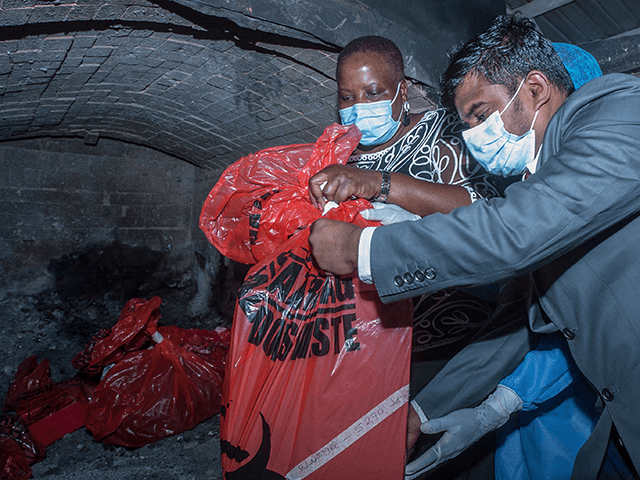Malawi’s government on Wednesday burned 19,610 expired doses of the Chinese coronavirus vaccine developed by AstraZeneca.
A batch of 102,000 doses of the AstraZeneca vaccine arrived in Malawi on March 26 through a program led by the African Union (A.U.) and the World Health Organization (W.H.O.). The batch expired on April 13, however, just 18 days after its arrival. While Malawi managed to administer 80 percent of the 102,000-dose batch before it expired, state health officials said Wednesday they did not have enough time to use all of the vaccines before their expiration date.
Malawi Health Minister Khumbize Chaponda oversaw a ceremony to destroy the expired vaccines in a hospital incinerator on May 19 at Kamuzu Central Hospital in Malawi’s administrative capital, Lilongwe.
“We are destroying (them) because, as government policy … no expired vaccine has ever been used,” Chaponda said at the start of the event.
“She then threw the shots, which were wrapped in red plastic bags, into an incinerator, causing a cloud of dark smoke to billow from its chimney,” Reuters reported.
“On behalf of the government I assure all Malawians that no one will be given an expired COVID [Chinese coronavirus] vaccine,” the health minister said.
Many thanks to the Media, Anti Corruption Bureau, National Audit Office, Malawi Police for witnessing the counting of the expired vaccine vials, loading of the same vials into the incinerator and then the setting ablaze of the vials pic.twitter.com/hrXkQcDvQ5
— Hon Khumbize Kandodo Chiponda MP (@HonKandodo) May 19, 2021
“When news spread that we had out-of-date vaccines, we noticed that people were not coming to our clinics to get immunized,” Malawi’s Principal Secretary of Health, Dr. Charles Mwansambo, told the BBC on May 19.
“If we don’t burn them, people will think that we are using expired vaccines in our facilities and if they don’t come, Covid-19 [Chinese coronavirus] will hit them hard,” he said.
“I would like to get vaccinated but how sure am I if I go to the hospital I won’t be given the expired vaccines?” a shopkeeper in Lilongwe named Jack Chitete told the BBC this week.
“I have heard a lot of stories about people getting blood clots and some even dying after getting immunized. Are those people telling lies? If it is the truth, why are we being given the same vaccines?” another Lilongwe shopkeeper, Mphatso Chipenda, asked the BBC.
The Democratic Republic of Congo (DRC) announced in late April it would return 1.3 million doses of AstraZeneca’s coronavirus vaccine to the U.N. after the country’s government failed to implement a formal plan to distribute them. The DRC government also cited citizens’ skepticism of the vaccine’s possible side effects as a reason for the inoculation campaign’s failure.
“AstraZeneca vaccines arrived in the DRC two months ago, but fear of side effects had delayed their launch,” Kenya’s East African reported on April 29.
AstraZeneca, a Swedish-British pharmaceutical company, developed its coronavirus vaccine jointly with Oxford University. The Serum Institute of India currently manufactures the shot. The European Medicines Agency, the E.U.’s health regulator, and British health regulators confirmed possible links between AstraZeneca’s coronavirus vaccine and blood clots developed by its recipients in early March. The news led at least 18 countries to pause their distribution of the vaccine in subsequent weeks, with Denmark halting its use entirely.
The Africa Centers for Disease Control and Prevention (Africa C.D.C.), part of the A.U., said on April 22 that AstraZeneca shots sent to Malawi with an expiration date of April 13 could still be safely used through July 13. The W.H.O. had similarly encouraged African nations not to discard expired AstraZeneca vaccines in April, claiming they could possibly be used beyond their expiration date.
“My understanding is that the expiry date could be several months longer than had initially been envisaged. But we will look for the definitive information,” Matshidiso Moeti, the W.H.O.’s Africa director, said at a news conference.
The W.H.O. issued an updated statement on the use of AstraZeneca’s vaccine on May 17, however, reversing its stance.
“While discarding vaccines is deeply regrettable in the context of any immunization program, W.H.O. recommends that these expired doses should be removed from the distribution chain and safely disposed of,” the organization said.

COMMENTS
Please let us know if you're having issues with commenting.